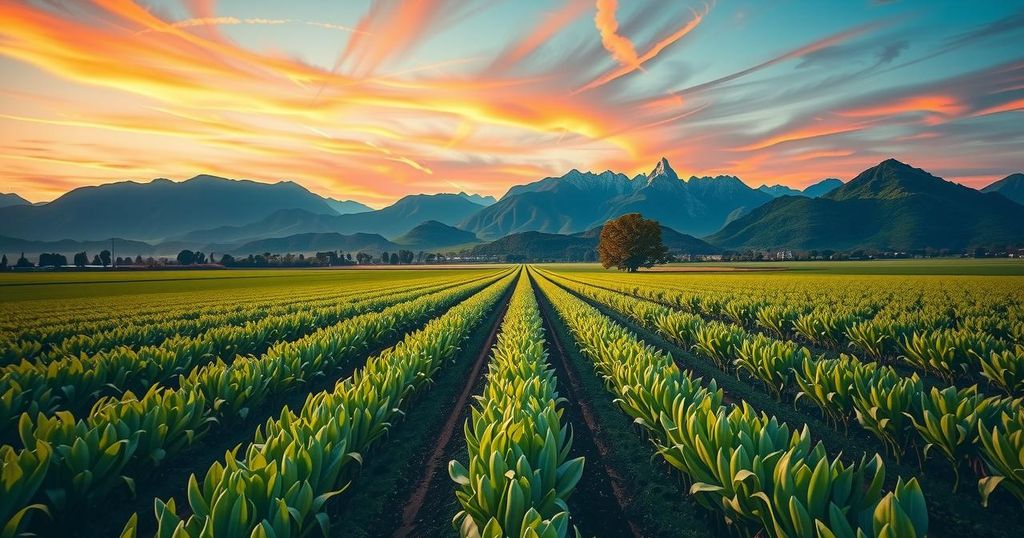Lifestyle
AFRICA, AGRICULTURE, CHARLES NUNN, CLIMATE CHANGE, DUKE UNIVERSITY, DURHAM, EUROPE, FOOD SECURITY, HEALTH, ITALY, MADAGASCAR, MANDENA, MAROJEJY, MAROJEJY NATIONAL PARK, NORTH AMERICA, OF ANTANANARIVO, PARK, PLOS CLIMATE, SARAHANDRANO, SAVA, UNITED STATES, UNIVERSITY
Daniel O'Connor
0 Comments
Challenges of Climate Change for Farmers in Madagascar’s Vanilla Region
Farmers in Madagascar’s Sava region are struggling to adapt to climate change impacts, as revealed by a recent survey of nearly 500 small-scale farmers. Many report declining water sources and changing weather patterns that disrupt agriculture, yet only a small fraction is making adaptive changes. Financial constraints play a significant role in this lack of action. As researchers continue to study these challenges, the focus remains on enhancing farmers’ resilience against climate-related adversities.
Farmers in Madagascar, particularly in the Sava region known for its vanilla production, are grappling with the impacts of climate change. A recent survey involving nearly 500 small-scale farmers indicates that erratic weather patterns are increasingly disrupting their agricultural practices. With the decline in both rainfall and water sources, farmers are struggling to sustain their crops and livelihoods, which are already under pressure.
Many farmers reported significant changes in their environment, such as drying rivers that hinder their ability to cultivate rice, a staple food. For instance, one farmer expressed her concern, stating that diminished water supplies could jeopardize her family’s future. Additionally, another farmer highlighted that the harvesting season for lychees has shifted due to prolonged dry spells, resulting in delays.
The study, published in PLOS Climate by researchers from Duke University and Madagascar’s University of Antananarivo, found that nearly all respondents are witnessing adverse changes in temperature and precipitation that complicate farming. Despite these challenges, few are adapting their practices, which raises concerns about food security in the future. Interviews conducted in villages near Marojejy National Park revealed that while the farmers demonstrate awareness, only one in five reported implementing adaptive measures such as altering planting schedules.
Research co-author Charles Nunn noted that a significant portion of the farmers have experienced drying water sources. Approximately 75% stated they spend less time on their farms due to adverse weather conditions resulting in scorching heat and extreme rainfalls. Other reported challenges include an increase in pests and health issues among villagers, highlighting the broader implications of climate change on local populations.
The disparity in adaptation efforts indicates financial barriers faced by many farmers, especially as a large portion of Madagascar’s population lives below the poverty line. Notably, socio-economic factors influence adaptation, as men and those with access to durable goods are more likely to enhance their farming practices. Senior co-author Randall Kramer emphasized the need for supportive programs to alleviate these economic burdens.
The study also proposes alternative methods to improve resilience, such as incorporating fruit trees in fields and fish farming, which can enhance pest control and fertilization. However, the immediate threats of cyclones and severe weather events complicate these initiatives. Northeast Madagascar’s farmers are not only confronting climate change but are also subjected to environmental disasters that could displace families and damage infrastructure essential for transporting crops to markets.
As patterns of adverse climate effects are observed across Madagascar, researchers are expanding their survey to include 34 villages. This expansion aims to confirm findings across diverse habitats and assesses the effectiveness of farmers’ adaptive strategies. The situation calls for resourcefulness and flexibility among farmers to confront the ongoing challenges posed by climate change, which ultimately jeopardizes their food security.
The survey of Madagascar’s farmers underscores the pressing challenges posed by climate change and reveals significant barriers to adaptation among small-scale agricultural producers. Most farmers acknowledge the adverse effects on their livelihoods but have shown limited willingness or capacity to adjust their agricultural practices due to financial constraints. As climate-related disruptions increase, it is crucial to implement programs that support these farmers in adopting more resilient practices to secure their food sources and ensure their long-term viability.
Original Source: www.eurekalert.org




Post Comment